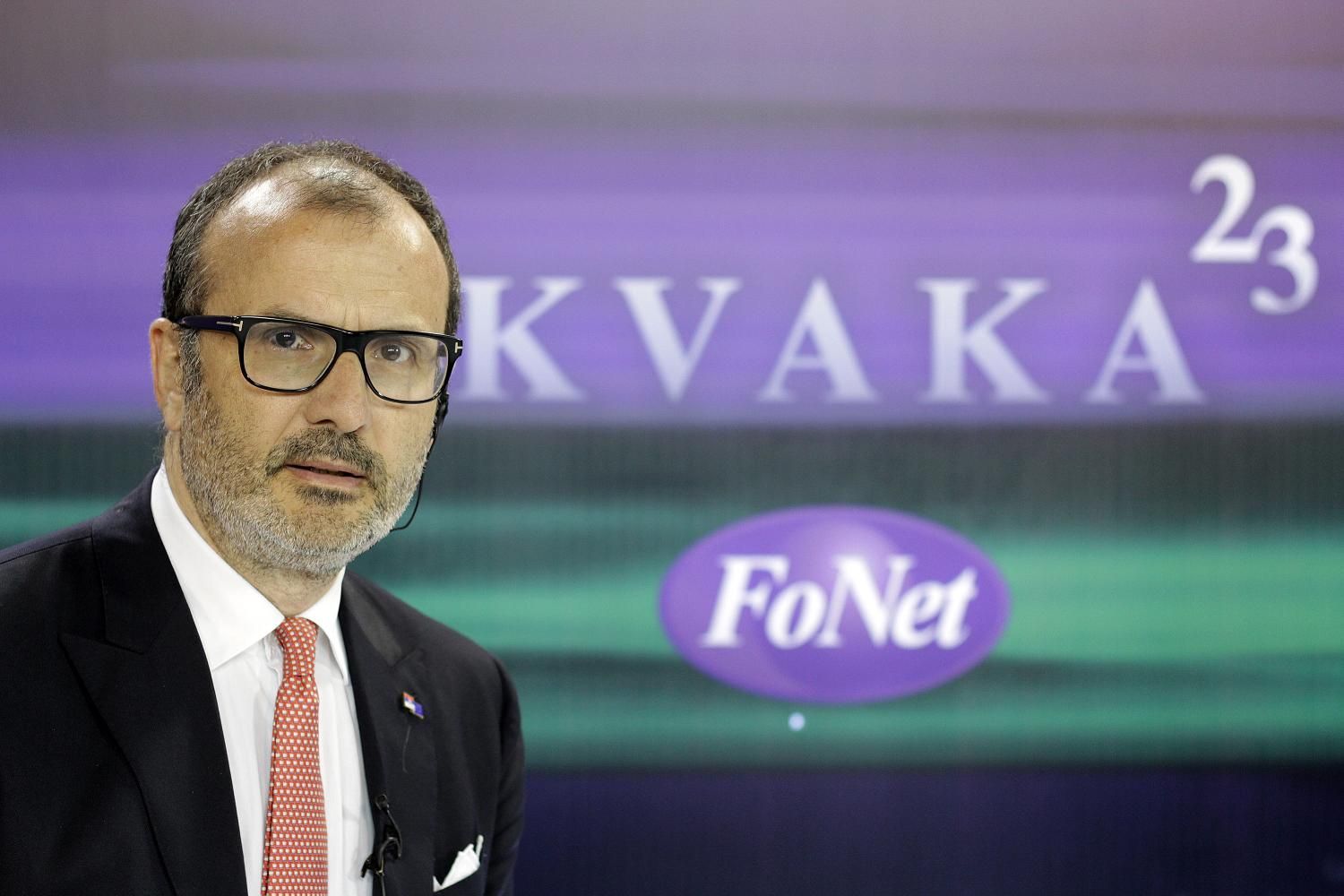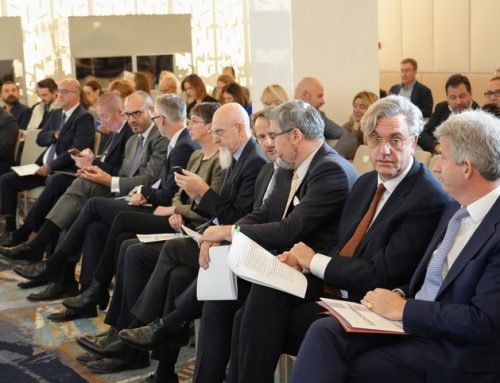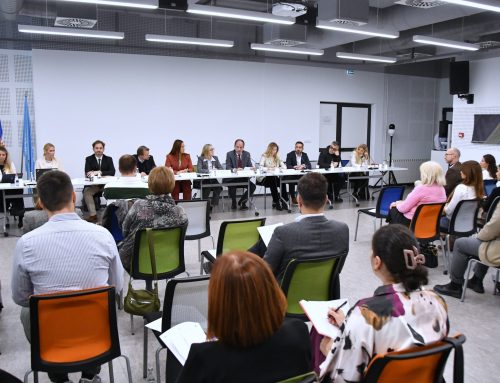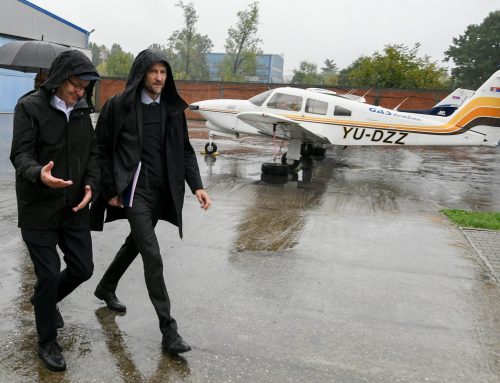Serbia’s path to the EU is irreversible, Head of the EU Delegation to Serbia Ambassador Sem Fabrizi told FoNet, noting that one should not wonder “if” but rather “when” Serbia would join the EU, adding that a legally binding agreement with Pristina does not “imply membership.”
Expanding on his irreversibility remark – despite dissonant tones from certain Serbian officials – in an interview he gave as part of Kvaka 23 series, Fabrizi once again described the process as “irreversible.”
“It’s not about me having faith, it’s about the results achieved,” he said and reminded that “two thirds of foreign investment in Serbia comes from the EU.”
At the same time, “two thirds of Serbian exports end up in the EU, people travel across Europe – that’s what I’m talking about when I say the process is irreversible,” Fabrizi said and added that the process of EU accession meant “economic, legislative and institutional harmonisation.” In that context, he believes that the President’s messages, official positions of the state and Government’s statements are consistent.
“We must look at the bigger picture, not analyse each minister’s message individually, because the position of the Government as a whole – and we could hear this in Subotica where we marked its first anniversary – is that Serbia’s future lies within the EU,” Fabrizi said.
According to him, 14 negotiating chapters opened thus far are seen as “a good result and tangible progress.”
Commenting on the notion – based on certain EU Council conclusions and the EC Annual Report – that, on the inside, Serbia does not look as a candidate country, Fabrizi said that “EU accession is an intricate process.”
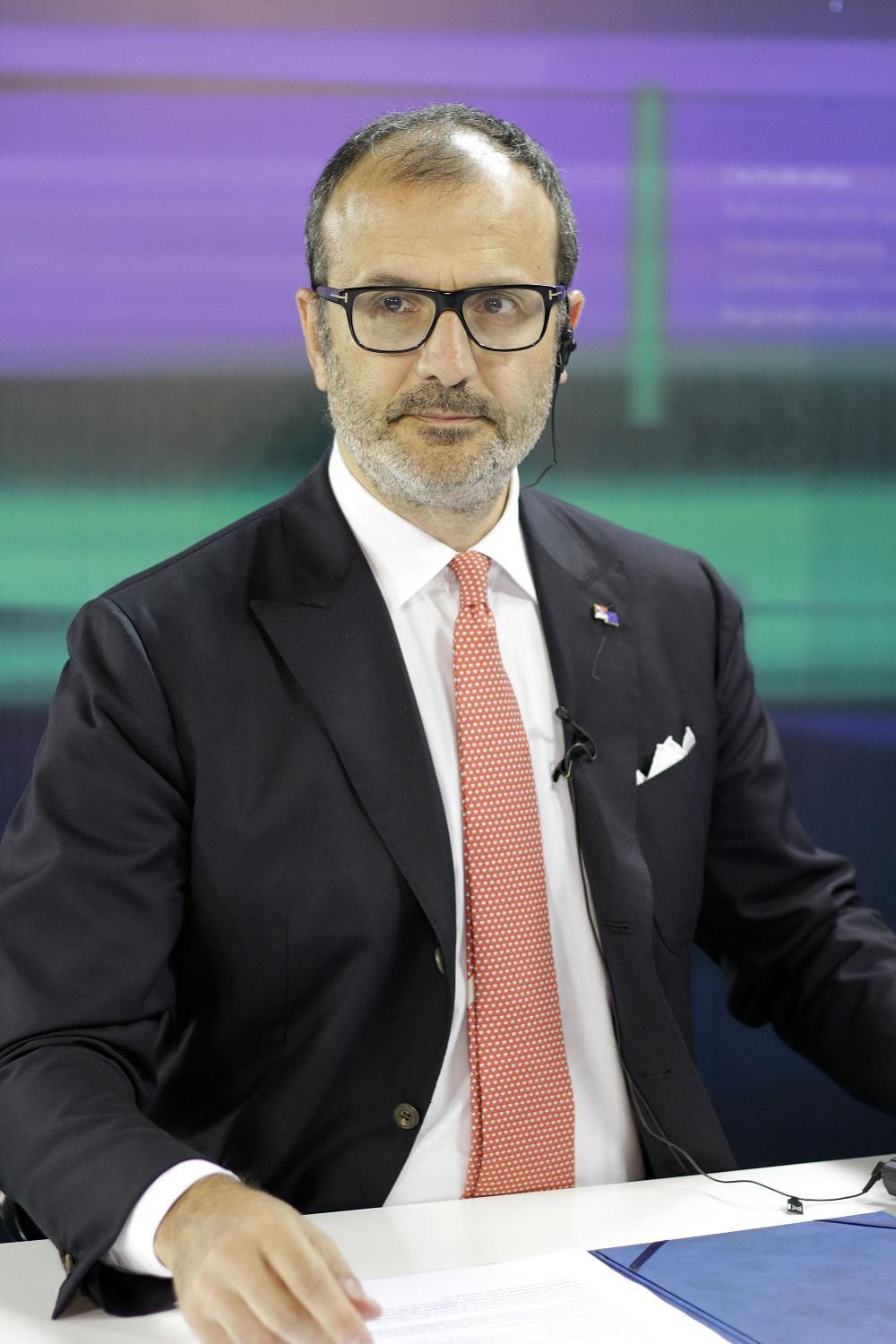 Negotiations, he said, deal with a number of issues, such as economy, democracy and migration, the rule of law – to name a few – adding that reports “paint a real picture and provide recommendations.” Fabrizi, however, does not agree that the “tone” of written reports and EU conclusions drastically differs from European officials’ assessments of Serbia, i.e. its progress on the EU path.
Negotiations, he said, deal with a number of issues, such as economy, democracy and migration, the rule of law – to name a few – adding that reports “paint a real picture and provide recommendations.” Fabrizi, however, does not agree that the “tone” of written reports and EU conclusions drastically differs from European officials’ assessments of Serbia, i.e. its progress on the EU path.
“I would not say there is a discord between what we write and what we say, on the contrary, I think we are being consistent,” Fabrizi said.
He said that EU representatives say “that Serbia has done many important things and achieved tangible progress,” but they also note that in certain areas, for example the rule of law, “the progress has been limited and more effort is needed.” When asked whether he would paint the picture of the rule of law in Serbia with the colours of demolition in Savamala or the implementation of Chapter 23 Action Plan, Fabrizi said that “the rule of law is a complex area.”
“It includes Parliament’s work, judiciary independence, minority rights, fundamental human rights and freedoms,” Fabrizi said, adding that “certain progress can be noted in that area, as evidenced in the Annual Report.”
“The most important thing is to identify areas that need further progress,” he said and underlined that “in this regard, Serbian Government’s commitment to progress is the most important.”
Commenting on the remark that draft Constitutional amendments submitted to the Venice Commission pointed to the fact that authorities have no intention of limiting political influence on the judiciary, Fabrizi said that “authorities had followed proper procedure.” As he noted, “the Government’s intention is to implement the Commission’s recommendations” so we should wait “to see the final result and draft.”
Status quo is neither needed nor useful
Asked whether there is any “urgency to end negotiations on Kosovo” or whether the Prime Minister is right when she says there are no deadlines, Fabrizi replied that “when it comes to the legally binding agreement, between urgency and the lack of a final deadline, there is a sense of necessity.”
According to him, “both sides must negotiate the agreement, its contents, the final reaching date, and understand that the status quo is neither needed nor useful; at their latest meeting in Brussels they agreed to speed up the process.”
When asked about EU’s attitude towards a potential referendum in Kosovo – which might be a turning point of Serbian politics – Fabrizi said that he “cannot reply to those questions” and reiterated that “the two sides should seek solutions to pending issues through negotiations.”
He refused to comment on statements made by the Foreign Minister Ivica Dacic who, bragging about the number of countries (six) which had revoked their recognition of Kosovo, said “we are not fighting Pristina, but its mentors and the ones who support Kosovo.”
“Those are the issues of status. We, the EU, remain neutral in that regard and our job is to facilitate the talks and the dialogue,” Fabrizi replied.
When asked why the Belgrade-Pristina dialogue is not a transparent process, he said that “this is a very important issue which, to certain extent, must be resolved in discretion.”
“It is up to both sides to communicate the state of play to their citizens,” Fabrizi said and noted that “the contents and consequences of the Agreement are everyday subject.”
“I believe both sides are responsible for relaying the contents of the talks to their respective citizens, and we are there only to facilitate the talks,” Fabrizi said.
He, however, agrees that the signature of a legally binding agreement with Pristina will not make Serbia an EU Member State automatically, noting that there are “35 chapters, with two of them covering the most important areas – normalisation of relations with Pristina and the rule of law.”
Those areas are completely different, but they will bring a conclusion to a historic issue with Pristina, transforming Serbia into a democratic country the way that will allow it to become a functioning member of the EU, said Fabrizi, who is optimistic when it comes to resolving both of those issues.
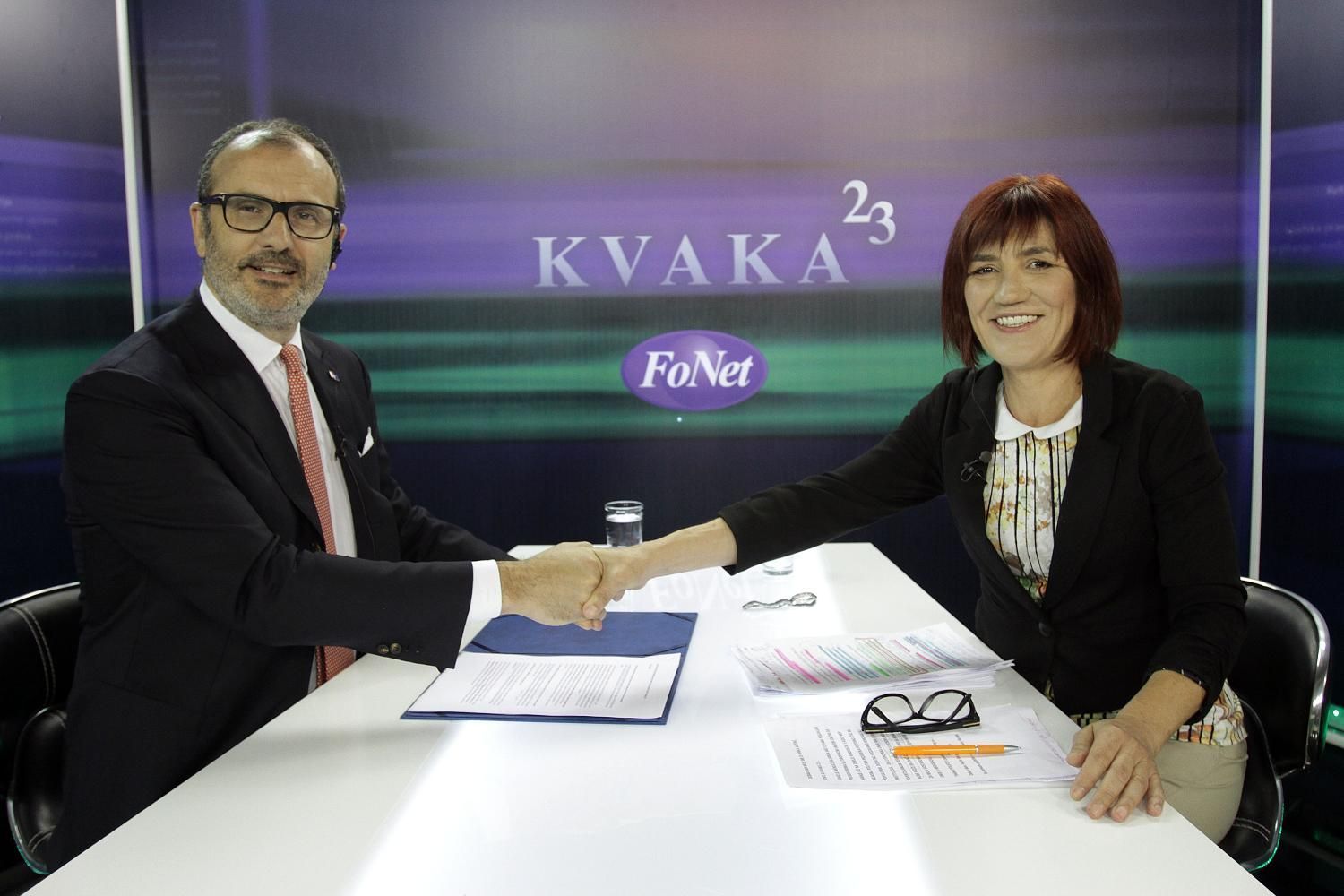 Media transformation in line with EU values
Media transformation in line with EU values
Speaking about the media, Fabrizi said that “the media sector, just as any other segment of the society, must undergo transformation in line with EU values.”
When asked whether the Government – without being put under pressure – should design the media environment itself, he replied that “the fact that the Government and media associations have set down around the same table and begun discussing the media strategy is a positive development and a proof that one of the recommendations from the Report is being followed.”
“I think the Government should realise that the media landscape in a democratic society must be regulated and that free access to media, advertising and public broadcasting services must be ensured,” Fabrizi said.
“We stated this very clearly in our Report and a taskforce should find a way to deal with it,” he said and added that “the Government has assumed this obligation” and that “the EU would encourage the joint taskforce’s work.”
Commenting on Russia’s influence in Serbia and the opinion that the money invested in and donated to Serbia by the EU is inversely proportional to its influence, Fabrizi reminded that “donations and grants are intended to support Serbia in taking necessary measures and become part of the EU.”
It is natural for Serbia to foster good relations with Russia
When it comes to Russia, he believes it is “natural for Serbia and many other – virtually all – European countries to foster good relations with Russia.”
Accession perspective, in terms of becoming part of a wider family, does not mean turning against anyone, Fabrizi said and added that “EU’s foreign policy is not targeted against any country in particular.” Expanding on harmonisation of Serbia’s foreign policy with the EU, he said Europe has common foreign policy views towards “Russia, China, the US or any other country in the world.”
According to him, “Serbia has assumed the obligation to fully align its foreign policy with the EU by the time of accession.”
I disagree with the opinion that that the accession process is uncertain and that its “chances are slim,” he said, adding that Serbia will indeed join the EU “once it implements all reforms.”
This is not a question of “if” but “when,” Fabrizi said, certain that the majority of people in Serbia recognise the benefits of healthier environment, better governance, increased transparency, respect for minorities and media freedom. He described the EU accession process as a course Serbia should pursue in order to change itself internally, whereas the difference in “enthusiasm” towards enlargement within the EU “depends on the point of view of each of those messages.”
“The reform of the Union goes hand in hand with enlargement,” Fabrizi said, supporting his claim with the example of Macedonia and Albania. “The Council has now committed to opening accession talks with the two countries in 2019.”
Commenting on the remark that the historic agreement between Macedonia and Greece has a discouraging effect on the region as Macedonia was given only a provisional and not an actual talks opening date, Fabrizi said that “it is quite the opposite; this is an encouraging sign as they might have ended up without being given any date at all.”
“The process is ongoing, the obligations have been assumed and if Macedonia complies with all of them next year, I don’t see why accession talks wouldn’t start,” Fabrizi said.
When asked how he felt in Belgrade, as he once said in an interview with an Australian magazine that in Italy, he felt like a Roman, in Brussels like an Italian and around the world like a European, Fabrizi replied: “I feel at home.”

